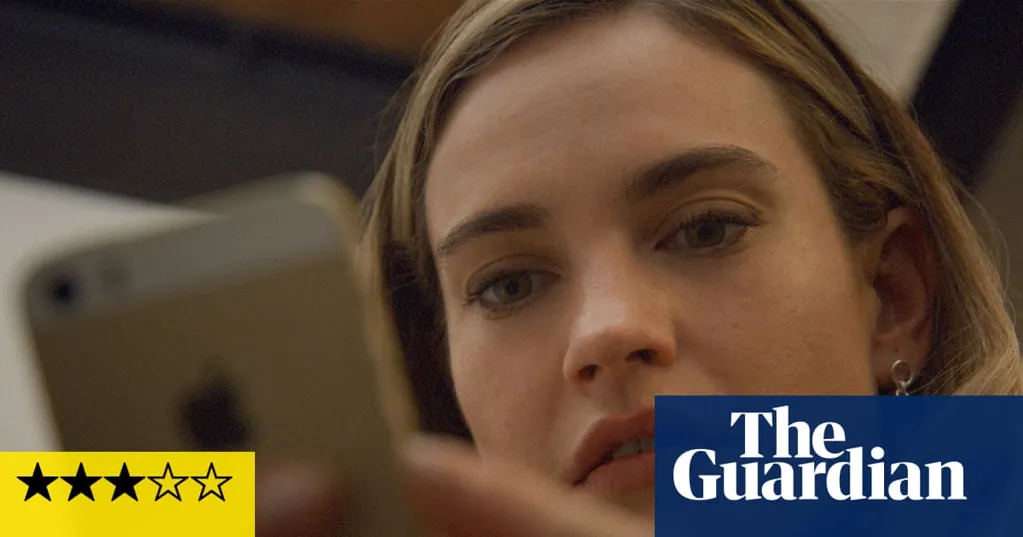Lily James plays former Tinder employee who became founder of Bumble in an illuminating yet corny rise-to-fame tale
In 2012, a plucky, headstrong young entrepreneur crashes a start-up mixer in Los Angeles, desperately trying to get their big idea off the ground. Naive and ruthlessly ambitious, they brave the skeptics, the losers, the people too good to talk to them and the people who don't take them seriously. Eventually, inevitably, their genius - obvious, unsinkable, perhaps diabolical - collides with opportunity. Voila! An origin story is born.
Swap out the date and the city, and this would describe a pivotal scene in any number of recent movies and TV shows that take cinematic interest in the self-mythology of entrepreneurs. The dramatic logic and iconography of the origin story, basically true but always highly glossed, is by now so recognizable it almost writes itself: initial rejection, dogged persistence, chance meeting, lightbulb moment, big break. We've seen it in a wave of brand backstory movies - Flamin' Hot, Air, BlackBerry and Tetris to name a few - as well as the recent boomlet of shows depicting 2010s hustle culture. The twist with Swiped, Hulu's new film on the founding of online dating titans Tinder and Bumble, is that this founder is a woman.
And it is quite a twist - the route Whitney Wolfe Herd (Lily James) takes to becoming the youngest self-made female billionaire is much rougher than that of her male peers, consistently potholed with misogyny, from standard-grade office sexism to sexual harassment and online slander. Swiped, directed by Rachel Lee Goldenberg (Unpregnant) from her script with Jennifer Gibgot and Andrew Panay, oscillates between acknowledgement of the tech world's - and, for that matter, the internet's - inherent misogyny, with a light, by-the-numbers portrait of a capitalist success. Characters speak in start-up pablum and punchy slogans. "Bill Gates cured polio - or malaria, or something. But you know what he did first? He made a $100bn," incubator head Sean Rad (Ben Schnetzer) tells Whitney when she presents her initial idea for an app to connect volunteers with charities. She's summarily hired as the head of marketing for one of Sean's apps which, as multiple office characters note, needs 1 million users in the first year to stand a chance.
All of this breezes by with little friction and a rose-tinted glow that feels a little odd for an app that so fundamentally changed how young people think about sex, dating and relationships writ large. In one scene that made me laugh out loud for its Big Game Energy at a conference table, Whitney scrambles out of the pocket and scores a touchdown with the name Tinder (as opposed to, say, Matchbox). In another, Whitney, a preternatural marketing genius from Salt Lake City, pits sorority girl insecurities against male lust at SMU and kills the future of IRL dating in five movie minutes.
These scenes are neither offensive nor particularly inspiring (beyond some Wikipedia searches), and proceed competently and dutifully, a smooth dose of 2010s lore with the soundtrack, highlights and leggings to match. Where Swiped grabs attention, and complicates an otherwise straightforward success narrative, is in depicting the genuinely appalling treatment of Wolfe Herd by her male coworkers. A months-long romance with Justin (Jackson White, believably sinister) quickly turns toxic; Goldenberg and James, suitably disappearing into fried blonde highlights and an angular American accent, bring us into Whitney's addled, righteous anger - the disparaging and constant text message harassment; the confusion over how to handle a fellow cofounder's abuse as the only woman in the room; her shocked betrayal when they close ranks, fire her and lock her in with an NDA. (Their side still went public, subjecting her to a firestorm of online harassment evocatively portrayed in a swirling montage of booze and tweets.)
Swiped especially shines in its willingness to challenge its protagonist, predominantly through her coworker-turned-best friend Tisha, a would-be Black best friend character if not for Industry’s Myha’la landing some punches on Whitney for pulling up the ladder behind her and dismissing harassment until it came for her. Same for Whitney’s working relationship with the dubious billionaire Andrey Andreev (Dan Stevens, doing a ridiculous, but I have to imagine researched, Russian accent), who gave her carte blanche funding to start Bumble, the women-centered dating app built to correct Tinder’s bro-y mistakes, while committing his own #MeToo sins. It’s a shame, then, that the film ultimately returns to credulous adulation for succeeding in this system; I’m not sure the grace note of Wolfe Herd getting permission from the Blackstone guy who just bought her company to stay on as CEO is the victory note the film-makers think it is.
Still, the history of how online dating went from deeply uncool to de rigueur is one worth telling, and Swiped’s methods, corny and contrived as they can be, are proficient enough to do it. You, as I, may have some reservations about another business movie as well as dating - but we’re here now.
